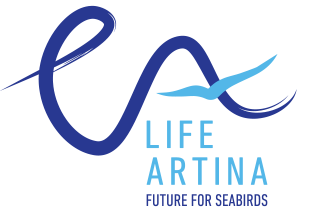
The Audouin´s gull, the more elegant relative of the yellow-legged gull (Larus michahellis), is a rare occurrence in the Adriatic Sea. The red beak, the dark eyes, the grey-green legs, and the light-blue cloak distinguish this smaller gull from the usual “coastal” gulls. This species breeds in the Mediterranean, and even 70% of the global population lives on the Ebro River delta in Spain. During the 1980s the population of the Audouin´s gull increased from 1000 to 22,000 pairs thanks to a great effort to protect this species. On the remote islands within Mljet and Lastovo archipelago in Croatia, only 13 to 60 pairs are nesting, depending on the year.
This small colony of Audouin’s gull was discovered recently in 1996. The position of the colony changes from year to year between islands. They usually breed on rocky islands with little grassy vegetation. On such islands, yellow-legged gull is also nesting and there are often in competition for habitat. Depending on the size of the local population, Audouin´s gull nests in larger or smaller colonies and even as singular couples in colonies of the yellow-legged gull.
The monogamous pairs build the nest, incubate eggs, and take care of the chicks together. The nest usually has 2 to 3 eggs, and chicks are hatched after a month. After another month the birds are already ready to fly, but they still stay with their parents for an additional 3 to 4 months. These gulls are migratory and they spend winter time in the southern Mediterranean and on the northwest coast of Africa, with the largest number wintering on the coast of Morocco.
Their main food is fish, sometimes cuttlefish, crabs and insects, and rarely birds (migrating across the island), herbal foods such as olives and seeds. Unlike other gulls, they rarely feed on waste. At the sea, they have characteristic hunting by flying low and slowly, with rigid strokes of wings and hanging shimmering legs. When they see the prey, they dive and grab it just by spraying the beak and sometimes the head.
Due to the small breeding population in Croatia, Audouin´s gull is endangered (EN) species by IUCN Threatened species classification. In Croatia it is protected by Nature Protection Law, while internationally by Annex I of the Birds Directive and Appendices I and II of Bern Convention. All breeding locations are listed as Special Protection Areas (SPA) for Natura 2000 Network, and they are situated in the Nature Park Lastovo Islands and the National Park Mljet.




